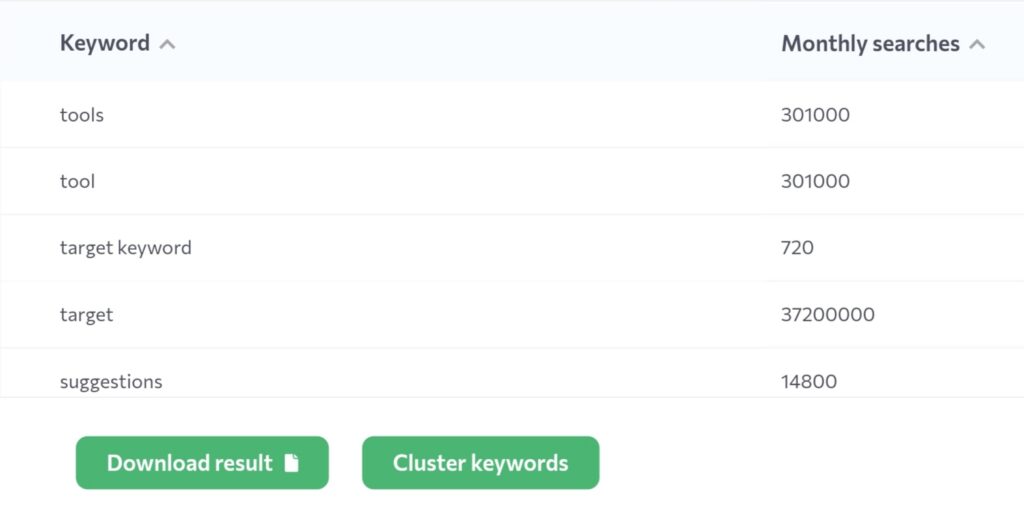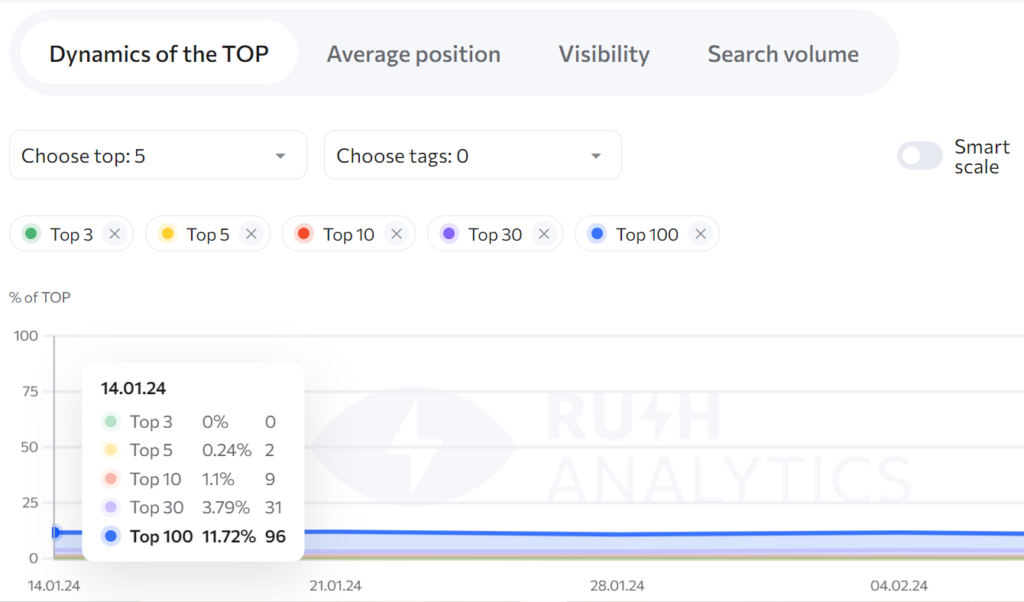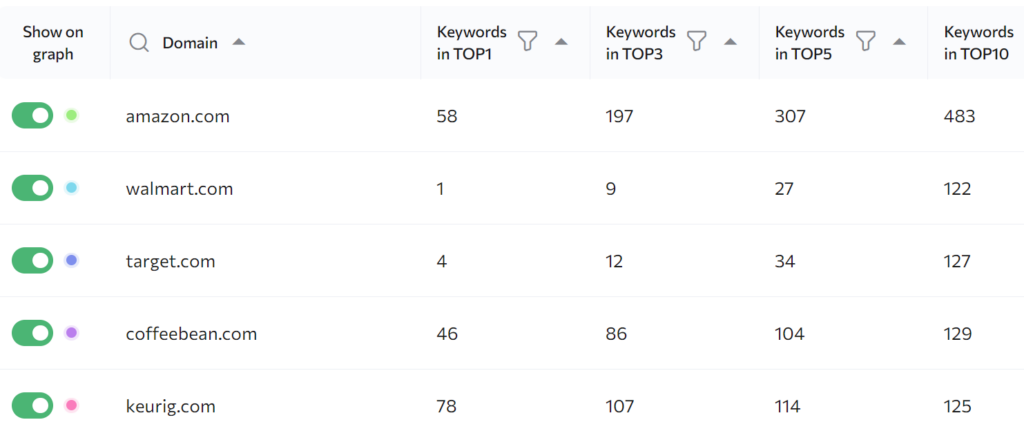Keyword Search Volume Checker
Discover keyword search volume from Google Keyword Planner in any geo, any language
The first 7 days are free.
No credit card needed!
The most accurate tool for checking Google search volume
Get results in a few seconds
- Experience unmatched speed as our platform swiftly delivers keyword search volume data, providing you with the tools to develop an effective SEO strategy enriched with in-depth insights. Gain access to thousands of keyword searches in just 60 minutes, without any geographical or language limitations.
Enjoy total accuracy
- Get real-time, precise keyword search volume data with Rush Analytics’ keyword search platform. Our platform shows you the exact number of searches for any given keyword, allowing you to accurately and efficiently plan your SEO strategies.
Exclude keywords that don’t matter
- Streamline your results list by removing irrelevant phrases with Rush Analytics’ intelligent tools. Our platform will exclusively include profit-generating keywords, increasing the likelihood of maximizing the returns from your SEO campaign.
What is a keyword search volume checker?
This is a sophisticated software meticulously designed to estimate the search volume for specific words on Google and other search engines. This reliable tool not only provides insight into search patterns, but also plays a key role in helping webmasters tailor their content to user search behaviour, increasing the visibility of their websites.

How it works
In an ever-evolving SEO landscape, the key to overcoming promotional challenges is to have an advanced keyword search volume checker at your disposal.
-
Choose Location and Language
Check out search volume in any geo
-
Upload keywords
Just enter your list of words and click ‘Start’. No need to work with tons of filters, proxies or captcha – the search volume will be displayed instantly.
Free keyword search tool vs Rush Analytics

The hallmark of any free keyword volume checker is its user-friendliness. With just two clicks, it’s incredibly easy to use – Google Keyword Planner is a prime example of this.
This accessibility makes it a preferred choice among This accessibility makes it a preferred choice among SEO experts looking to estimate the volume of specific keywords. However, these platforms rely solely on relevant keyword search statistics sourced from Google Ads and Bing, offering no additional insights.
Rush Analytics goes beyond being a mere free keyword tool; our platform is designed to provide additional features and growth opportunities. Users get a complete view of their website’s performance and access additional data from sponsored searches in Google Ads.
As a result, you can discover new keywords to boost your advertising efforts and get recommendations on how to get your site to the top of search results pages.


Finally, Rush Analytics serves as a one-stop-shop for discovering keywords and scrutinising your competitors’ SEO strategies.
This equips you with a broader array of tools and insights than any free keyword checker or Google Ads account could ever offer.
Start using Rush Analytics today
Get 7 days free trial access to all tools.
No credit card needed!

Flexible pricing
to suit your needs
- 0,00055 USD for 1 keyword
Depending on the subscription plan *
What experts say about us
How to do keyword research
Identifying the perfect keywords for targeting can be accomplished using a keyword planner, which also provides insights into the actual searches made by your target audience on Google. This knowledge can guide both your smaller-scale marketing plan and your content strategy.
Here’s a step-by-step guide on how to organize your keyword research using keyword research tools:
-
Step 1
Compile a list of relevant topics and subjects based on your company’s expertise.
Before delving into search volume analysis, define the relevant keywords. Start by considering the broader subject areas you want to rank for. Create five to ten subject categories essential to your business, which will serve as a foundation for generating keyword ideas. -
Step 2
Categorize keywords within those topics.
Select keywords that align with the topic categories you’ve identified. Use Keyword Grouper from Rush Analytics to organize keywords into logical groups within each topic, making it easier to analyze and optimize for specific keyword clusters that are critical to your SEO strategy. -
Step 3
Balance head phrases and long-tail keywords in each category.
Head terms are typically one to three words long and are more generic, while long-tail keywords are longer phrases, usually containing three or more words with lower keyword search volume. To ensure a well-balanced keyword strategy that caters to both long-term goals and immediate successes, include a mix of head phrases and long-tail terms. Keep in mind that head phrases are often more competitive and challenging to rank for. -
Step 4
Consider user intent in keyword research.
Beyond the literal meaning of keywords, consider the searcher’s intent, which is critical to your ranking success. To understand intent, type the keyword directly into search engines and observe the types of results that appear. Make sure that the content you plan to create is closely aligned with the searcher’s intent. -
Step 5
Explore related keywords and phrases.
If you’re struggling to come up with additional keyword ideas related to a specific topic, look at the related search terms that appear when you enter a keyword into Google or other search engines. Google often provides related keyword suggestions at the bottom of search results. Use the Rush Analytics’ Keyword Volume Checker to verify the search volume of these related keywords, ensuring you focus on high-impact terms. -
Step 6
Analyze your competitors’ keyword rankings.
While you don’t have to blindly follow your competitors, it’s essential to assess their keyword strategies. Just because a keyword is essential to your competitor doesn’t mean it’s significant for your business. However, if your competitor is already ranking well for specific queries on your list, it makes sense to focus on improving your ranking for those keywords. Additionally, consider pursuing keywords that your competitors may not have optimized for; this can open up opportunities to capture search traffic and gain market share. Track your progress using the Rush Analytics’ Rank Tracker, which will allow you to monitor changes in keyword positions over time.
Now that you have a list of keywords to incorporate into your content, analyze their search volume and make predictions about how your pages will rank. Remember that tools, such as Rush Analytics, can significantly improve and speed up the process of checking keyword search volume.
Get 7 days free trial access to all tools.
Pick the right keywords with bulk keyword search volume tool
Try for freeRelated Features
Keyword Search Volume FAQ
How do I find the search volume of certain words?
Keyword planners, such as Rush Analytics, are essential tools for determining the search volume of specific words. They provide a list of the most frequently searched words related to your semantic field, with search volumes and competitiveness metrics. Using these platforms is as easy as 1-2-3: simply input your desired keywords into the checker and apply filters if necessary. Now you’re ready to optimize your content!
What is the search volume?
Search volume represents how many times a particular word or phrase was searched on a search engine, such as Google, within a specific time frame. Understanding search volume is essential if you want to attract an audience relevant to your niche, as it helps you determine which words to include in your content. A high search volume indicates that you have the potential to attract more visitors to your website. Conversely, using unpopular keywords may not be beneficial because they may not resonate with the people you want to engage with.
How to find out the keyword volume on YouTube?
YouTube itself neither displays this metric nor ranks searches by popularity. In this scenario, using an additional keyword search volume checker becomes essential. Alternatively, you can also use Google Keyword Planner to plan your content for YouTube. Knowing the popularity of keywords, both more and less popular ones, you can craft a more efficient video content strategy and attract more viewers to your YouTube channel.
Learn more about this tool by exploring our
Frequently Asked Questions Guide ➜




